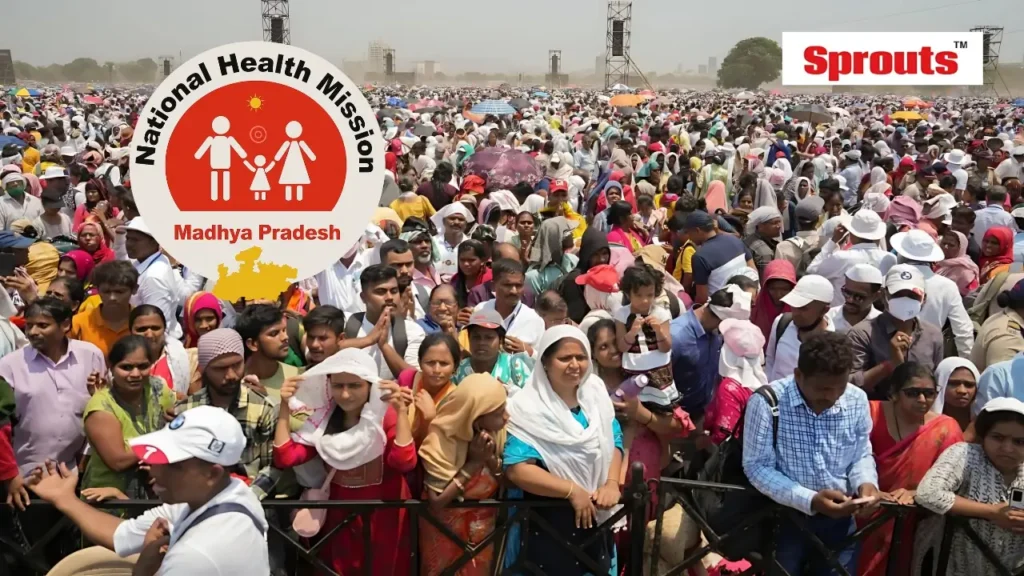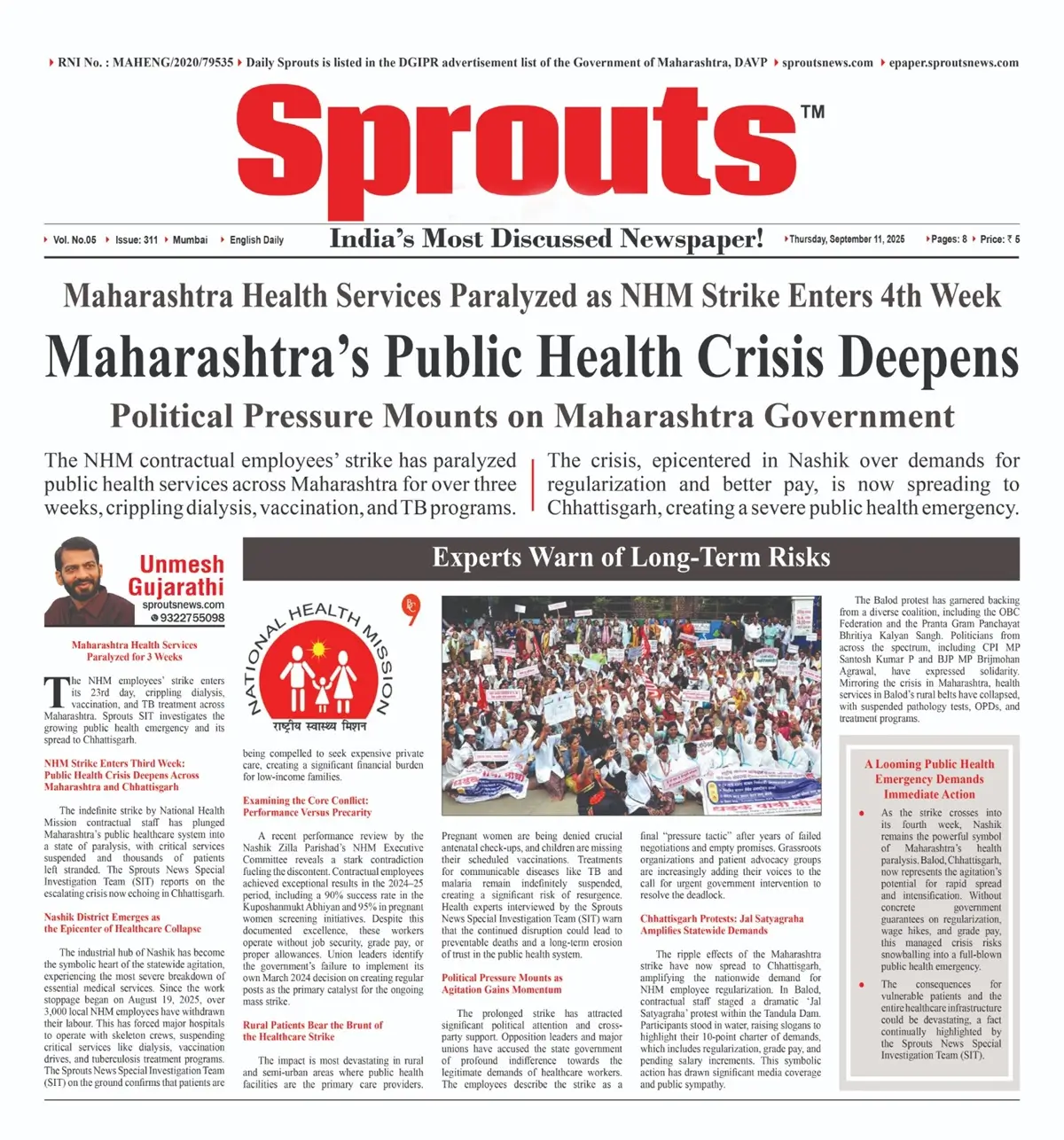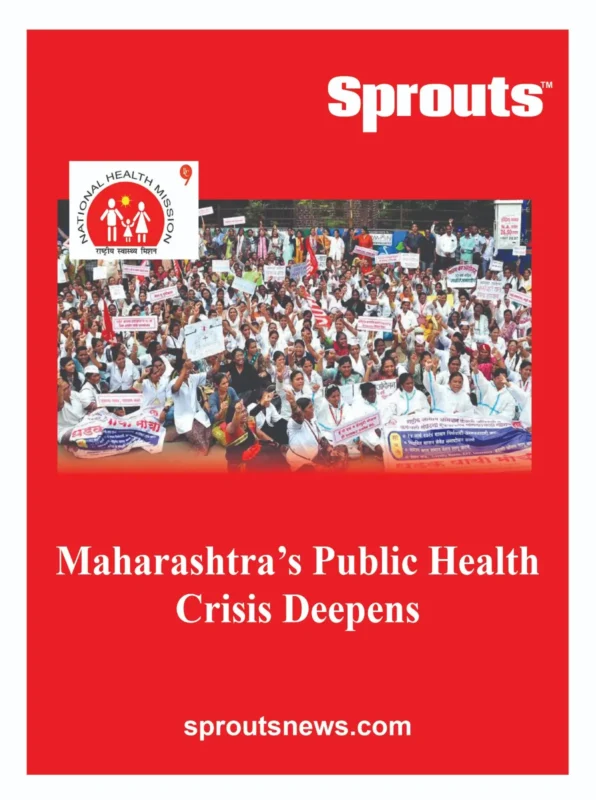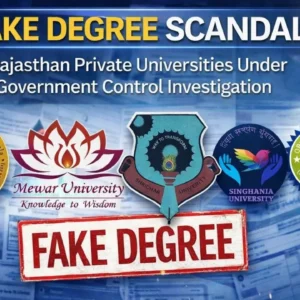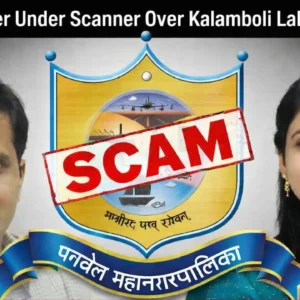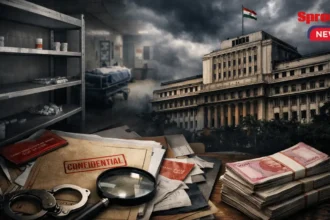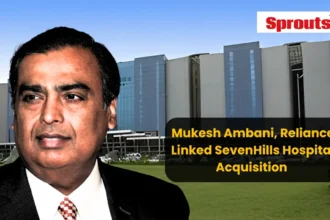Maharashtra’s Public Health Crisis Deepens
• Maharashtra Health Services Paralyzed as NHM Strike Enters 4th Week
• Political Pressure Mounts on Maharashtra Government
• Experts Warn of Long-Term Risks
Unmesh Gujarathi
Sprouts News Exclusive
Contact: +91 9322755098
- Maharashtra’s Public Health Crisis Deepens
- • Maharashtra Health Services Paralyzed as NHM Strike Enters 4th Week
- • Political Pressure Mounts on Maharashtra Government
- • Experts Warn of Long-Term Risks
- Maharashtra Health Services Paralyzed for 3 Weeks
- NHM Strike Enters Third Week: Public Health Crisis Deepens Across Maharashtra and Chhattisgarh
- Nashik District Emerges as the Epicenter of Healthcare Collapse
- Examining the Core Conflict: Performance Versus Precarity
- Rural Patients Bear the Brunt of the Healthcare Strike
- Political Pressure Mounts as Agitation Gains Momentum
- Chhattisgarh Protests: Jal Satyagraha Amplifies Statewide Demands
- A Looming Public Health Emergency Demands Immediate Action
The NHM contractual employees’ strike has paralyzed public health services across Maharashtra for over three weeks, crippling dialysis, vaccination, and TB programs. The crisis, epicentered in Nashik over demands for regularization and better pay, is now spreading to Chhattisgarh, creating a severe public health emergency. Experts warn this escalating standoff could cause irreversible damage to India’s fragile healthcare network.
Maharashtra Health Services Paralyzed for 3 Weeks
The NHM employees’ strike enters its 23rd day, crippling dialysis, vaccination, and TB treatment across Maharashtra. Sprouts SIT investigates the growing public health emergency and its spread to Chhattisgarh.
Click Here To Download the News Attachment
NHM Strike Enters Third Week: Public Health Crisis Deepens Across Maharashtra and Chhattisgarh
The indefinite strike by National Health Mission contractual staff has plunged Maharashtra’s public healthcare system into a state of paralysis, with critical services suspended and thousands of patients left stranded. The Sprouts News Special Investigation Team (SIT) reports on the escalating crisis now echoing in Chhattisgarh.
Nashik District Emerges as the Epicenter of Healthcare Collapse
The industrial hub of Nashik has become the symbolic heart of the statewide agitation, experiencing the most severe breakdown of essential medical services. Since the work stoppage began on August 19, 2025, over 3,000 local NHM employees have withdrawn their labour. This has forced major hospitals to operate with skeleton crews, suspending critical services like dialysis, vaccination drives, and tuberculosis treatment programs. The Sprouts News Special Investigation Team (SIT) on the ground confirms that patients are being compelled to seek expensive private care, creating a significant financial burden for low-income families.
Examining the Core Conflict: Performance Versus Precarity
A recent performance review by the Nashik Zilla Parishad’s NHM Executive Committee reveals a stark contradiction fueling the discontent. Contractual employees achieved exceptional results in the 2024–25 period, including a 90% success rate in the Kuposhanmukt Abhiyan and 95% in pregnant women screening initiatives. Despite this documented excellence, these workers operate without job security, grade pay, or proper allowances. Union leaders identify the government’s failure to implement its own March 2024 decision on creating regular posts as the primary catalyst for the ongoing mass strike.
Rural Patients Bear the Brunt of the Healthcare Strike
The impact is most devastating in rural and semi-urban areas where public health facilities are the primary care providers. Pregnant women are being denied crucial antenatal check-ups, and children are missing their scheduled vaccinations. Treatments for communicable diseases like TB and malaria remain indefinitely suspended, creating a significant risk of resurgence. Health experts interviewed by the Sprouts News Special Investigation Team (SIT) warn that the continued disruption could lead to preventable deaths and a long-term erosion of trust in the public health system.
Political Pressure Mounts as Agitation Gains Momentum
The prolonged strike has attracted significant political attention and cross-party support. Opposition leaders and major unions have accused the state government of profound indifference towards the legitimate demands of healthcare workers. The employees describe the strike as a final “pressure tactic” after years of failed negotiations and empty promises. Grassroots organizations and patient advocacy groups are increasingly adding their voices to the call for urgent government intervention to resolve the deadlock.
Also Read: NHM Collapse: Presidential Petitions Ignored, Rural Healthcare in Crisis.
Chhattisgarh Protests: Jal Satyagraha Amplifies Statewide Demands
The ripple effects of the Maharashtra strike have now spread to Chhattisgarh, amplifying the nationwide demand for NHM employee regularization. In Balod, contractual staff staged a dramatic ‘Jal Satyagraha’ protest within the Tandula Dam. Participants stood in water, raising slogans to highlight their 10-point charter of demands, which includes regularization, grade pay, and pending salary increments. This symbolic action has drawn significant media coverage and public sympathy.
The Balod protest has garnered backing from a diverse coalition, including the OBC Federation and the Pranta Gram Panchayat Bhritiya Kalyan Sangh. Politicians from across the spectrum, including CPI MP Santosh Kumar P and BJP MP Brijmohan Agrawal, have expressed solidarity. Mirroring the crisis in Maharashtra, health services in Balod’s rural belts have collapsed, with suspended pathology tests, OPDs, and treatment programs.
A Looming Public Health Emergency Demands Immediate Action
As the strike crosses into its fourth week, Nashik remains the powerful symbol of Maharashtra’s health paralysis. Balod, Chhattisgarh, now represents the agitation’s potential for rapid spread and intensification. Without concrete government guarantees on regularization, wage hikes, and grade pay, this managed crisis risks snowballing into a full-blown public health emergency. The consequences for vulnerable patients and the entire healthcare infrastructure could be devastating, a fact continually highlighted by the Sprouts News Special Investigation Team (SIT).


